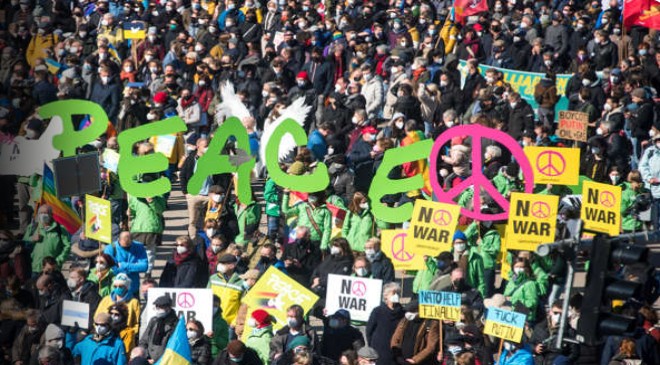WASHINGTON – CIA Director William Burns recently offered a stark assessment of the alliance between Russia and China during a high-profile hearing on Capitol Hill.
It is driven by “very cold-blooded” calculations, the U.S. spy chief – a former U.S. ambassador to Russia – told lawmakers on Thursday.
Chinese President Xi Jinping may be “unsettled” by Russia’s invasion of Ukraine, Burns said, but his partnership with Vladimir Putin is unlikely “to change any time soon.”
U.S. officials have been keeping close tabs on Beijing’s response to Putin’s aggression against Ukraine – looking for signs of a rupture or harmony, support or vexation.
As the war enters its third week and civilian casualties mount, Beijing has tried to stay on the sidelines. But Xi could play a pivotal role – either in bolstering Russia militarily and economically or pressing Putin to stand down.
It’s against that backdrop that National Security Adviser Jake Sullivan will meet in Rome on Monday with Chinese foreign policy adviser Yang Jiechi.
“Defining moment for Xi, China and 21st century,” Richard Haass, president of the Council on Foreign Relations, tweeted on Sunday.
Helping Russia would open China up to substantial sanctions and it would become a pariah, Haass wrote. Refusing would “keep open the possibility of at least selective cooperation” with the U.S. and the West.
The meeting between Sullivan and Yang has been in the works for a while, as a follow up to a virtual meeting President Joe Biden and Xi held in November – an effort, at the time, aimed at easing tensions between Washington and Beijing.
The White House emphasized that Monday’s discussion will cover a range of topics. But it’s the first high-level, in-person talks between the U.S. and China since Russia invaded Ukraine last month – a move that has unleashed withering international sanctions on Moscow and upended the geopolitical landscape.
What is China’s role?
Not long after the meeting was announced, The Washington Post and other outlets reported Russia has asked China for military equipment to help its war effort and economic assistance to cushion the blow of sanctions.
“Russia would like China to step in to mitigate sanctions,” said Notre Dame Law School professor Mary Ellen O’Connell, author of “The Crisis in Ukraine.” Beijing could play a constructive role in pressing Putin – if Xi chooses that path, she said.
“The more Russia hopes China can help it out of its sanctions issues, China has leverage for Russia to halt the invasion,” O’Connell told USA TODAY.
China is in a tough spot. The war is adding to China’s economic concerns, and Xi does not want to invite additional trade friction with the West. But Beijing and Moscow are equally interested in undermining America’s global leadership and challenging Western democracies.
“Xi and Putin have a very mutually reinforcing relationship. And I don’t think that Xi is going to do anything that causes Putin to fall from power,” said Michael Green, an Asia expert at the Center for Strategic and International Studies. “Xi does not want to face the West without Russia.”
The U.S. has been warning China not to come to Russia’s aid.
“We are communicating directly, privately to Beijing that there will absolutely be consequences for large-scale sanctions evasion efforts or support to Russia to backfill them,” Sullivan said on CNN’s “State of the Union” Sunday. “We will not allow that to go forward.”
In addition to reiterating that position in person, Sullivan may also see if China is willing to help negotiate an end to the war, said Howard Stoffer, a veteran of the U.S. State Department who teaches international affairs at the University of New Haven.
“I think what they’re going to be trying to figure out is if the Chinese are interested in creating an off-ramp for Putin,” Stoffer said. “China is really one of the few countries that has a political interest in Ukraine and Russia, and also has connections to the United States.”
Beijing’s balancing act
But other foreign affairs experts said they don’t expect China to stick out its neck.
“Based on everything they’ve said so far, it’s hard to see them doing a 180 and suddenly playing some kind of a constructive role in this crisis,” said Ian Johnson, senior fellow for China studies at the Council on Foreign Relations.
The joint statement that Putin and Xi issued during their meeting at the start of the Winter Olympics in Beijing, detailing their “no limits” friendship and shared positions on a range of issues, was “the most sweeping expression of their commitment to partnership we’ve seen,” Burns told the Senate Intelligence Committee Thursday.
The U.S. believes China was aware, before the invasion started, that Putin was planning something, Sullivan said Sunday.
“They may not have understood the full extent of it,” he added, “because it’s very possible that Putin lied to them, the same way that he lied to Europeans and others.”
Since the invasion, China has largely been on the sidelines, Johnson said. Officials have neither endorsed the invasion nor condemned it. But they’ve criticized the sanctions imposed on Russia as “harmful to all sides.” And, Johnson said, China has taken “regular potshots” at the U.S., including spreading Russian disinformation that the U.S. is financing biological weapons labs in Ukraine
Still, Burns said Putin may be overestimating how much China is able or willing to help him mitigate the sanctions.
“I think they’re concerned about economic consequences at a time when their own projected growth rates are lower than they’ve been in quite some time,” Burns said, noting that China is preparing for its party congress in November.
Playing both sides?
The longer the war in Ukraine continues unabated, the more precarious Beijing’s position will become as China’s leaders seek to maintain economic stability in the lead-up to the party congress when Xi “will assume a once unthinkable third term,” said Craig Singleton, a senior fellow at the Foundation for the Defense of Democracies (FDD), a nonpartisan think tank focused on foreign policy and national security issues.

There is some evidence that people in China, though mostly scholars, are having second thoughts about the usefulness and reliability of Russia as a partner, Green said.
Wang Huiyao, the head of a Beijing think tank who advises the Chinese government, wrote in the New York Times Sunday that “Beijing’s interests in more proactive involvement are growing by the day.”
“Beijing could help to broker an immediate cease-fire as a prelude to talks among Russia, Ukraine, the United States, the European Union and China,” he wrote.
But Green, who focused on Asia as a member of the national security council during the George W. Bush administration, said there’s no expectation that the Chinese are capable of, or interested in, serious mediation.
“There’s no indication in China’s recent diplomatic history that they’ve ever been serious about mediation between disputing parties, or good at it,” Green said. “And there’s no indication that Putin’s going to do anything other than just pound cities, double down in this attack.”
Matthew Schmidt, an expert on strategic analysis at the University of New Haven, said China won’t risk its long-term plan of emerging mid-century as the dominant force in the world, or at least a close second to the U.S., for Putin. But Xi is also not ready to give up Russia as an ally.
“He’s going to try to stay in the middle,” Schmidt said, “and play both sides.”







































